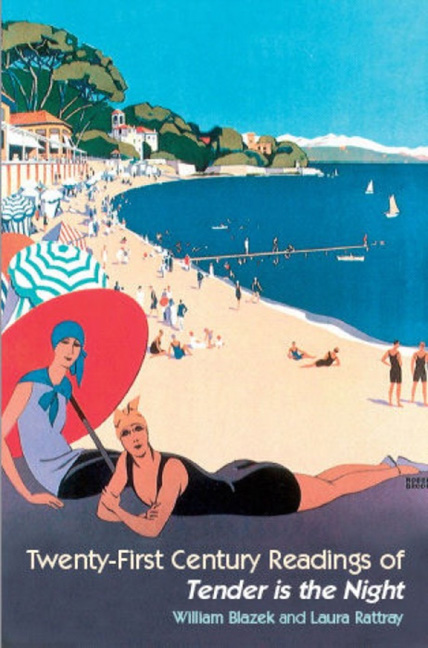Book contents
- Frontmatter
- Contents
- Acknowledgements
- List of Illustrations
- Introduction
- 1 ‘Can't We Put it in Writing?’: Some Short Precursors to Tender Is the Night
- 2 Tender Is the Night, ‘Jazzmania’, and the Ellingson Matricide
- 3 Sanatorium Society: The ‘Good’ Place in Tender Is the Night
- 4 ‘Some Fault in the Plan’: Fitzgerald's Critique of Psychiatry in Tender Is the Night
- 5 An ‘Unblinding of Eyes’: The Narrative Vision of Tender Is the Night
- 6 Si le soleil ne revenait pas: Swiss Clockwork Gone Mad in Tender Is the Night
- 7 ‘A Unity Less Conventional But Not Less Serviceable’: A Narratological History of Tender Is the Night
- 8 American Riviera: Style and Expatriation in Tender Is the Night
- 9 ‘Out Upon the Mongolian Plain’: Fitzgerald's Racial and Ethnic Cross-Identifying in Tender Is the Night
- 10 Gender Anxiety: The Unresolved Dialectic of Fitzgerald's Writing
- 11 Tender Is the Night and the Calculus of Modern War
- 12 Reading Fitzgerald Reading Keats
- Notes on Contributors
- Index
8 - American Riviera: Style and Expatriation in Tender Is the Night
- Frontmatter
- Contents
- Acknowledgements
- List of Illustrations
- Introduction
- 1 ‘Can't We Put it in Writing?’: Some Short Precursors to Tender Is the Night
- 2 Tender Is the Night, ‘Jazzmania’, and the Ellingson Matricide
- 3 Sanatorium Society: The ‘Good’ Place in Tender Is the Night
- 4 ‘Some Fault in the Plan’: Fitzgerald's Critique of Psychiatry in Tender Is the Night
- 5 An ‘Unblinding of Eyes’: The Narrative Vision of Tender Is the Night
- 6 Si le soleil ne revenait pas: Swiss Clockwork Gone Mad in Tender Is the Night
- 7 ‘A Unity Less Conventional But Not Less Serviceable’: A Narratological History of Tender Is the Night
- 8 American Riviera: Style and Expatriation in Tender Is the Night
- 9 ‘Out Upon the Mongolian Plain’: Fitzgerald's Racial and Ethnic Cross-Identifying in Tender Is the Night
- 10 Gender Anxiety: The Unresolved Dialectic of Fitzgerald's Writing
- 11 Tender Is the Night and the Calculus of Modern War
- 12 Reading Fitzgerald Reading Keats
- Notes on Contributors
- Index
Summary
Among its many enlightenments, Andrew Turnbull's biography Scott Fitzgerald establishes a truth essential to understanding the life of its subject: ‘With Europe and the Murphys, Fitzgerald came as close as he ever would to finding perfection in the real world, and in a way the rest of his life was a retreat from this summit’ (176). By the sands of Antibes in the home they built and named Villa America, the Murphys created a salon – the centre, as Dirk Bogarde was to describe it, ‘of a gorgeous, glittering carousel […] Looking back at them today sprawled in the sun, laughing and dancing, is a little like turning the pages of old bound copies of Vanity Fair and Tatler. Scintillating, beautiful, remote and far out of reach’ (8). For Archibald MacLeish, too, ‘there was a shine to life wherever they were […] a kind of inherent loveliness’ (Vaill 7), and wherever in Tender Is the Night Fitzgerald provides a vision of graceful expatriation, there the Murphys are, shining still as the very spirit of expatriate style. They were the creators of those ‘many fêtes’ that the novel's winsome dedication seems to gift and bless them with, as though in a deed of reciprocal generosity. In a letter to Gerald Murphy, Fitzgerald acknowledged both extensive debts and a profound entente: ‘the book was inspired by Sara and you, and the way I feel about you both and the way you live, and the last part of it is Zelda and me because you and Sara are the same people as Zelda and me’ (Tomkins 5). The way the Murphys lived would indeed become the luminous blueprint for an American arcadia in Tender, and though Fitzgerald would often create permutations on the theme of paradise lost in his life and writing, only here in his final completed novel does he succeed in tracing fully the tragic arc of sublimity declining to ruin.
‘Please do not use the phrase “Riviera” […] not only does it sound like the triviality of which I am so often accused, but also […] its very mention invokes a feeling of unreality and unsubstantiality’ (Life in Letters 247).
- Type
- Chapter
- Information
- Twenty-First Century Readings of ‘Tender is the Night’ , pp. 143 - 159Publisher: Liverpool University PressPrint publication year: 2007

